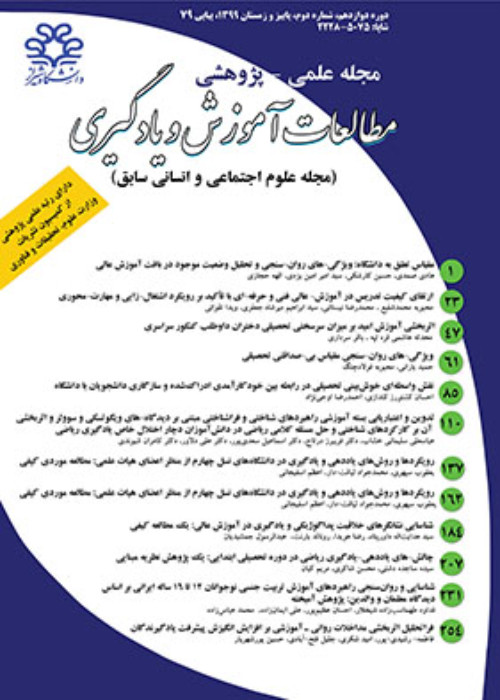Mindfulness and Psychological Well-Being: The Mediating Role of Self-esteem
Psychological well-being, characterized by positive emotions and overall life satisfaction, encompasses various domains such as family, education, and more. Riff’s model conceptualizes psychological well-being as a comprehensive developmental process that spans an individual’s lifespan. One construct related to consciousness that has been discussed for its impact on well-being is mindfulness. Mindfulness, defined as conscious, deliberate, and continuous attention in the present moment, is a burgeoning field of research in mental health. Empirical evidence suggests that teachers should employ mindfulness training to enhance students’ psychological well-being. Another variable addressed in this research is self-esteem, a crucial construct associated with a broad spectrum of psychological outcomes such as general psychological adjustment, positive emotions, social confidence, personal behavior, and life satisfaction. Research findings indicate a positive correlation between self-esteem and all dimensions of psychological well-being. To the best of the researcher’s knowledge, no study has directly or concurrently examined the relationship between the variables of the present study. The current research aims to compile and test this set of relationships in a model format. Accordingly, this study was conducted to investigate the relationship between mindfulness and psychological well-being, with self-esteem serving as a mediator. Research Hypothesis: The research hypothesis is as follows: Self-esteem mediates the relationship between mindfulness and psychological well-being.
The current research employs a correlational method to investigate the structural relationships between the research variables using the structural equation modeling. The research population comprised all undergraduate students of Islamic Azad University, Marvdasht branch, enrolled in the 2020-2021 academic year. Upon data collection and entry into the computer, SPSS-25 and AMOS-20 software were utilized. The sample size was determined to be 393 individuals, selected using the cluster sampling method. Initially, four faculties (Humanities, Basic Sciences, Technical Engineering, Educational Sciences, and Psychology) were randomly selected from the faculties of Islamic Azad University of Marvdasht branch. Subsequently, three classes were chosen from each faculty, and all students in these classes completed the questionnaires individually. It is worth noting that Kline’s recommendation (2016) was considered in determining the sample size. Kline (2016) suggests that the appropriate sample size for the structural equation modeling test should be 10 to 20 times the number of parameters of the research model. The inclusion criteria for the study were informed consent of the participants and enrollment in the specified academic year, while the exclusion criteria were a history of specific physical and mental illness (according to the subjects’ self-report) and incomplete questionnaires. The APA ethical code, comprising important principles and ethical standards, was adhered to in this research. The majority of participants in the current research were female, numbering 203 (51.65%), with an average age of 21.44 and a standard deviation of 3.25 years. Male participants numbered 190 (48.35%), with an average age of 21.30 and a standard deviation of 3.39 years.
The findings demonstrated a good fit between the research model and the collected data. Furthermore, the results indicated that the direct effects of mindfulness on self-esteem and psychological well-being, as well as the direct effect of self-esteem on psychological well-being, were significant. Notably, the impact of mindfulness on psychological well-being, mediated by self-esteem, was also significant. These findings suggest that self-esteem serves as a mediator in the relationship between mindfulness and psychological well-being.
This study aimed to explore the mediating role of self-esteem in the relationship between mindfulness and the psychological well-being of a student cohort. The findings related to direct relationships revealed a positive and significant direct effect of mindfulness on students’ psychological well-being. This outcome can be interpreted as mindfulness, through its role in promoting happiness, cheerfulness, and mental clarity, inherently fostering a positive and pleasant state in an individual. Indeed, it can be posited that mindfulness of events and experiences can be beneficial and effective for mental health. The study results also indicated a positive and significant direct effect of mindfulness on self-esteem. Individuals practicing mindfulness exhibit non-judgmental acceptance of their situation, which contributes to maintaining secure self-esteem. Additionally, the results revealed a positive and direct relationship between self-esteem and psychological well-being. In essence, self-esteem is positively correlated with all dimensions of psychological well-being. Individuals with higher self-esteem tend to have better psychological health and exhibit a reduced psychological response to stress. Regarding the primary hypothesis of the study, which postulated that “self-esteem plays a mediating role in the relationship between mindfulness and psychological well-being,” the present research validated this hypothesis. Given the results obtained and considering the role of mindfulness and self-esteem in explaining psychological well-being, it is feasible to enhance students’ psychological well-being by conducting educational workshops on mindfulness and self-esteem. Consequently, it is recommended that similar research be conducted in other universities, taking into account the ethnic, cultural, economic, and social lifestyle of the students to obtain more reliable results. One limitation of the current research is its reliance on causal inference from the relationships included in the proposed model.
- حق عضویت دریافتی صرف حمایت از نشریات عضو و نگهداری، تکمیل و توسعه مگیران میشود.
- پرداخت حق اشتراک و دانلود مقالات اجازه بازنشر آن در سایر رسانههای چاپی و دیجیتال را به کاربر نمیدهد.



